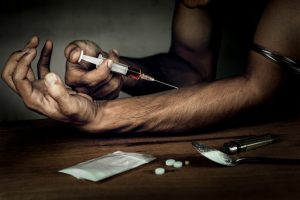I’m tempted to lead with some bad joke, like Christian Zammas is exchanging hard drugs for soft. It is true. He has gone from using hard drugs to peddling soft one(s) - caffeine.

This
All brought about by a sort of epiphany that has motivated him to gather up people with the same failings and help them be empowered, through the Katora Institute.
Eves Dropping on His Addiction Story
I overheard him telling a mutual friend his story one day. A story that started at the tender age of 11 he told me when I went to find out more. We sat at one of the tables outside Katora Coffee shop in Fredericksburg. Him, with his tattoos, scraggly short beard, restlessly smoking cigarettes, and greeting every passer by. It was a bit of a challenge to keep him on point.

Not This
It was alcohol and marijuana at first he said. Then a seminal moment when he was age 14 and having a panic attack at the mall (“I didn’t want to shop”) and his mum gave him a Xanax.
“It calmed me down completely. I was fascinated with that” he told me. He then proceeded to “swipe them from her” and took them pretty regularly for about 3 weeks. Then went into withdrawal.
“Progress” to Hard Drugs
He moved on to pain medicines like Vicodin or Percocet, that he stole from his father who had cancer, or that he persuaded his dentist prescribed him, or that he bought on the street - for about $5 a pill.
With further “progress” he went to shooting up heroin, or stuff called Krocodil – a synthetic morphine/heroin compound manufactured from codeine (often in Russia where codeine can be bought over the counter). It contains α-chlorocodide – hence the name.
This has many impurities and caused massive necrosis of his arm around the vein. He nearly lost the arm – now has a ferocious looking scar instead.
He had a frenetic job cooking in a restaurant, and found taking narcotics “gave me motivation.” He also describes the pleasure of shooting up as being “like being dipped in a tub of hot chocolate and sunshine.”
But I was “spending every dime” he told me, and was very afraid of withdrawal, with its intensive flue like symptoms. His life was falling apart, and he tried treatment where he was living in North Carolina. But he repeatedly relapsed – one time nearly dying of an overdose after he’d been clean for a while. “It took three Naloxone hits to save me.” He didn’t realize his tolerance had changed.
In desperation, he followed his ex and his two kids to Fredericksburg where he went to live in a local homeless shelter and got hooked up with a counseling service where he still goes and gets maintenance methadone.
Salvation for Him and Others
He has met and married a new lady – April. They have opened the Katora Coffee shop in downtown Fredericksburg. But more than that they have founded the Katora Institute of Higher Living, providing a “lifestyle education epicenter” to help people “find and nurture their own sense of purpose.” This centers around an organic farm, they have opened and they work on - with plans for a “garden-to-table” restaurant.
Christian’s is good story of redemption. But made all the more honorable by trying to help others in the same boat. I tell my friends “if you need some drugs . . . . . . go see Christian” – explaining my bad joke is referring to caffeine and not heroin of course.
Medical Footnote:
As a doctor, there are features of Christian’s story that interest me.
- Opiates are his “drug of choice.” They quell his discomforts and make him feel good. But drugs of choice tend to be very person specific. “I can do cocaine all day long and never crave it” he notes. It’s interesting that people’s particular discomforts and quirks are often matched to one specific drug. But then they are likely to get addicted to one drug.
- Shooting up drugs intravenously is dangerous. There’s no going back if you’ve injected too much. You can’t vomit like with pills. And there’s nothing to filter out the impurities that can damage your veins and poison you, unlike snorting, swallowing or inhaling.
- Tolerance to opiates is massively variable. A major downside is tolerance. You need more and more to get the same buzz. But if you’ve stopped for a while, your tolerance drops off. Many people die of overdoses if they’ve stopped for a while, but take the dose they used to take, not realizing their tolerance has changed.
- Prescription drugs can be a gateway to illicit drug use – causing all kinds of problems for doctors and pain patients as the DEA, the CDC and others impose draconian regulations. But often it is not genuine patients that are diverting to the illicit market (though it is the genuine patients that suffer).
- New synthetic products like Krokodil, fentanyl and car-fentanyl are very potent at suppressing your respiratory center – which is how people die when they OD. No one knows the safe dose, and lots of people find out the hard way.

